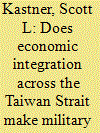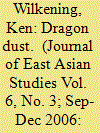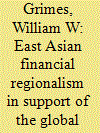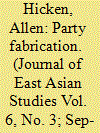| Srl | Item |
| 1 |
ID:
075475


|
|
|
|
|
| Publication |
2006.
|
| Summary/Abstract |
Deepening economic ties across the Taiwan Strait are widely believed by analysts and scholars to be a stabilizing force in cross-Strait political relations. Yet within the broader international relations literature, the relationship between economic interdependence and military conflict continues to be controversial. This article examines the impact of growing cross-Strait economic links on the likelihood of cross-Strait military conflict within the context of this broader literature. A description of three separate causal mechanisms-identified in the existing literature-through which economic ties could promote peace, is followed by a discussion of how widely these processes are operating in the Taiwan Strait case Although the article does not rule out the possibility that economic integration across the Strait makes a military confrontation less likely, it shows that the evidence in support of such a proposition is ambiguous.
|
|
|
|
|
|
|
|
|
|
|
|
|
|
|
|
| 2 |
ID:
075474


|
|
|
|
|
| Publication |
2006.
|
| Summary/Abstract |
Are scientific or nonscientific factors most influential in initiating international cooperation on newly emerging transboundary environmental problems in the Asia and Pacific region? In a case study of long-range atmospheric transport of dust, which is linked to desertification in China and Mongolia, the relative influence of scientific versus nonscientific factors in promoting cooperation in the Asia and Pacific region is analyzed. The study examines two dimensions of the problem-Northeast Asia and North America-and demonstrates that similar to the distance-dependence of the problem (i.e., dust concentrations decrease the greater the distance from the sources), cooperation follows a parallel relationship (i.e., motivation to cooperate decreases the greater the distance from the sources). Scientific cooperation in Northeast Asia is being institutionalized, but North America has not joined this effort. A synergy between factors must be invoked to explain this situation. In both cases, obvious and often dramatic negative impacts of massive dust storms are an enabling factor allowing more subtle science-related factors to come to the fore.
|
|
|
|
|
|
|
|
|
|
|
|
|
|
|
|
| 3 |
ID:
075471


|
|
|
|
|
| Publication |
2006.
|
| Summary/Abstract |
East Asian financial regionalism has advanced significantly since the rejection of Japan 's Asian Monetary Fund proposal in 1997. Key ASEAN+3 initiatives include the Chiang Mai Initiative, which is designed to provide emergency liquidity to economies experiencing currency crisis, and the Asian Bond Market Initiative, which seeks to develop regional bond markets. Surprisingly, these initiatives-despite the assertive "regionalist" rhetoric that has surrounded them and their intellectual origins in the analysis of the 1997-1998 Asian financial crisis-are explicitly designed to complement existing features of the global financial architecture, including IMF conditionality and global financial standards. The nesting of East Asian financial regionalism within the global financial architecture results from the political-economic interests of the leading economies of the region. In the absence of a major change in the political-economic environment, nesting is a stable equilibrium and is unlikely to change.
|
|
|
|
|
|
|
|
|
|
|
|
|
|
|
|
| 4 |
ID:
075473


|
|
|
|
|
| Publication |
2006.
|
| Summary/Abstract |
In the aftermath of the economic crisis of 1997-1998 South Korea undertook a number of reforms in financial supervision. Questions have been raised, however, as to whether Korea has in fact succeeded in creating a system of financial supervision capable of dealing with certain risks and responding to new challenges. This article examines Korea's recent experience in financial instability resulting from misconduct by credit card companies as a case in point and argues that the postcrisis reform in financial supervision was limited to changing formal institutions for financial supervision and that further reforms will have to be undertaken in other related institutions if Korea is to improve its financial supervision.
|
|
|
|
|
|
|
|
|
|
|
|
|
|
|
|
| 5 |
ID:
075472


|
|
|
|
|
| Publication |
2006.
|
| Summary/Abstract |
Among the most interesting questions in Thai politics today is how to account for the rise and (until recently) the success of Thaksin Shinawatra and his Thai Rak Thai party. This article describes and analyzes some of the factors that contributed to the rise and success of Thaksin and Thai Rak Thai, arguing that neither Thaksin's personal assets nor the effects of the crisis are enough to explain Thai Rak Thai's rise and success. It focuses instead on the 1997 changes to Thailand 's constitution. These institutional reforms were crucial because they altered Thailand 's political-institutional landscape in fundamental ways. The reforms provided new opportunities and incentives for political actors that Thaksin and his party adeptly took advantage of. The argument presented is that the key reforms that helped pave the way for the rise of Thaksin and Thai Rak Thai were those reforms that helped reduce the number of political parties and that increased the power of the prime minister relative to coalition partners and intraparty factions.
|
|
|
|
|
|
|
|
|
|
|
|
|
|
|
|